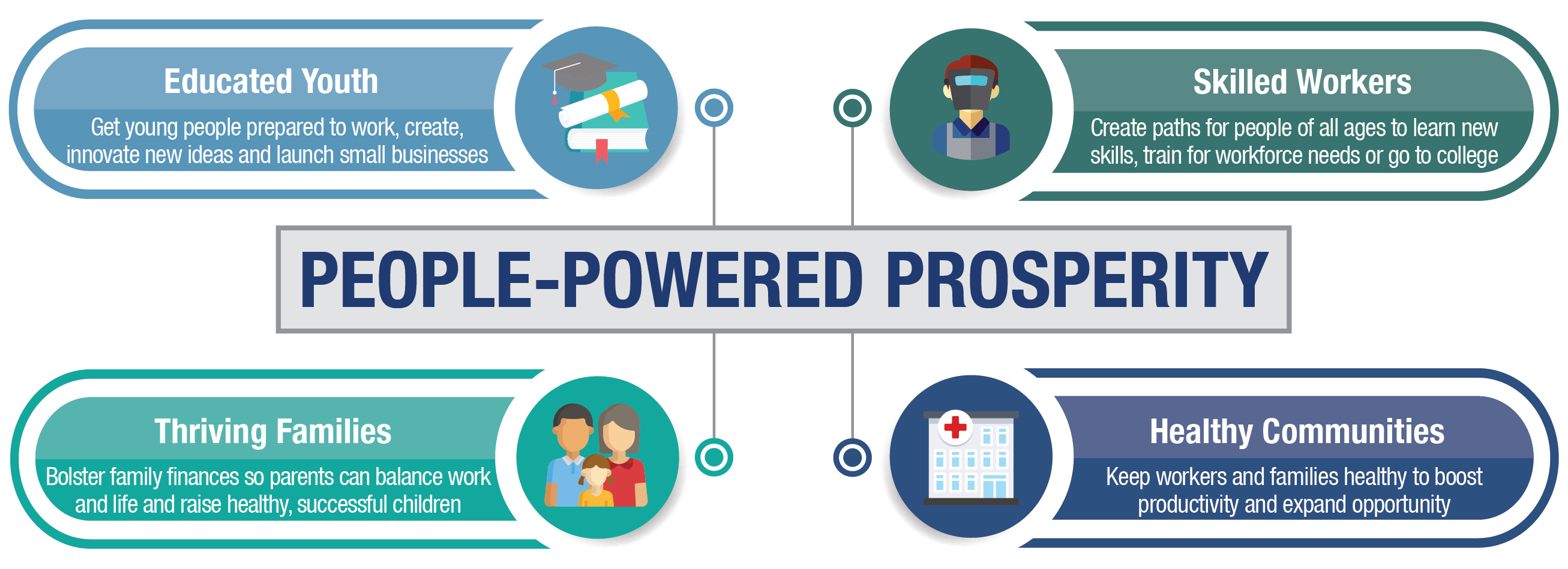Georgia today fails to fully leverage the state’s most powerful economic asset—its own people. The most successful, prosperous states are those that build a broad and inclusive middle class, with ample opportunities for people to work their way into it. When families hold good-paying jobs and have money to spend at local shops and restaurants, businesses and the broader economy reap the benefits. When young people attend quality schools that instill a love of learning, they become the next generation of entrepreneurs and inventors. When workers are healthy, literate and well-trained, they fill critical workforce gaps and help their companies grow. When social and economic barriers for women, people of color and immigrants are dismantled, everyone can enjoy the promise of an equitable and prosperous future. The Peach State already can claim many positive trends in its favor. Thousands of new workers and entrepreneurs move to Georgia each year from around the globe. The state’s economy is adding jobs more quickly than many other states, and corporate trade magazines consistently hail Georgia as the number one place to do business. Georgia’s fiscal house is also in better shape than places like Kansas and Illinois that enacted reckless tax and budget policies in recent years.
Yet at the same time, Georgia falls short of its true economic potential. Nearly one in four Georgia children live in poverty, where many face under-resourced schools and endure home challenges like hunger. Families at all income levels struggle with sky-high college and child care costs, making it harder to stay above water or get ahead. Rural communities face an exodus of people and an influx of opioids, while many urban neighborhoods face steep structural barriers to opportunity. Even in places where circumstances are good, the benefits of growth are not well-shared. And historic inequities for people of color and women, along with unusual obstacles for Georgians born outside the United States, persist. These shortcomings harm not only individuals and families but also companies, communities and the economy as a whole. As the geographic hub and economic engine of the South, Georgia is capable of so much more.
Moving into the 2018 statewide elections and subsequent governor’s administration, Georgia leaders can seize a golden opportunity to chart a better economic course. People-Powered Prosperity details a new vision for how state lawmakers can pursue that strategy and ways they can responsibly pay for it.
The report outlines a public investment plan aimed at four strategic goals, which include eight specific policy recommendations such as targeted funding hikes for public schools and an ambitious ramp-up of assistance to help families afford child care. We also present a case to show how Georgia can afford to raise $1 billion in new annual revenues as a meaningful down payment on the strategy, a shared investment of reasonable scope. Today Georgia ranks 42nd among the states on a common measure of state and local taxes and $1 billion in additional revenue still keeps Georgia’s taxes low compared to other states. A plan of this size is also similar to what Gov. Nathan Deal and leaders from both parties rallied support for in 2015 to repair Georgia’s roads and bridges.
Four Strategic Goals are Key to a Stronger Georgia
The Peach State holds the promise of a place with a more inclusive economy and more secure middle class, where families from diverse backgrounds rise out of poverty and where lots of new wealth still flows to innovators. To reach that goal, state lawmakers need a new economic vision. Georgia has long employed a business-first approach to the economy, defined by corporate tax breaks, lax regulations and low wages. But what Georgia needs for a stronger and fairer economy is a people-first strategy focused on four strategic goals: Educated youth, skilled workers, thriving families and healthy communities.
Educated Youth. States with a more educated workforce tend to have stronger economies overall and quality schools help equip communities to compete in today’s global marketplace. Students need both hard skills to one day enter the workforce and a deeper love of learning that leads to new ideas, products, businesses and richer lives. Reaching that goal depends on relentless support for early childhood education and public K-12 schools.
Skilled Workers. Companies and entrepreneurs thrive when they can find workers with a rich set of skills. Policies that support higher education, training programs and basic literacy can offer people lifelong learning opportunities that help minimize workforce gaps and empower Georgians to transform their lives, improve their earnings and career opportunities and contribute more to their communities and the economy.
Thriving Families. When parents have money in their pockets to make ends meet and to save or invest in their families’ future, the overall economy realizes the gain. Policies such as stronger child care assistance and targeted tax breaks for families can help parents contribute more to the workforce by better balancing career and caregiving responsibilities, while also creating a more stable home environment for children’s future success.
Healthy Communities. Part of having a strong economy that makes good use of everyone’s potential is making sure people are healthy so they can contribute. People are more likely to show up to work on time, get the job done right or start a small business when they’re able to see a doctor when sick or access targeted services for things like substance abuse treatment to get back on their feet. Parents and children who are financially secure and can access good schools, decent jobs and quality public services also tend to be healthier overall.
Summary of Policy Recommendations in People-Powered Prosperity
Educated Youth
Update Georgia’s K-12 funding formula to meet today’s rigorous standards.
Georgia spends well below the national average to support its public schools, and lawmakers consistently shortchange the state’s own funding formula. A sustained commitment to modernizing the formula and boosting funding long-term can improve student learning and future economic success.
Empower districts to invest in proven solutions, especially in high-need schools.
Schools in high-poverty communities score lower on common metrics of student success, due to overwhelming challenges of entrenched poverty. Tailored investments in proven solutions such as a good principal in every school can help provide every child with the chance to learn.
Skilled Workers
Expand aid options to make university education more affordable and technical college tuition-free.
Georgia has a proud legacy of higher education but too many capable students fall through the cracks due to cost. An expanded suite of financial aid options can help young people and adults alike gain the skills they need to fill the jobs of both tomorrow and today.
Increase funds for adult basic education, language literacy and skills-training programs.
State support for services that help adults learn new skills, train for emerging workforce needs or gain entry level abilities such as language literacy can help to fill companies’ short-term openings and empower people to transform their lives and careers.
Thriving Families
Help more working parents afford child care.
Skyrocketing costs for quality child care make it hard for parents who are working, running a business or going to school to balance career and home responsibilities. Expanding Georgia’s under-resourced assistance program can help parents contribute to the economy while they provide the best shot possible for their children to thrive.
Enact a Georgia Work Credit.
Twenty-nine states offer a targeted tax break to families working their way into the middle class. At up to a few hundred dollars a year, the credit gives parents a modest boost to support their children, afford the basics and make one-time investments such as a reliable car to get to work.
Healthy Communities
Expand health coverage so workers and entrepreneurs can see a doctor.
Access to health coverage helps people live stronger, more industrious lives. Expanding Medicaid under the federal health care law to cover adults would let more workers and entrepreneurs visit a doctor when they are sick and contribute to their communities.
Invest in mental health and substance abuse treatments.
A durable economy needs a reliable pipeline of workers at all skill levels, including people who face unique obstacles. More state support to address rising challenges like opioid addiction can help keep Georgians on their feet and in the workforce.
Raise $1 billion in new revenues as a down payment on the plan.
To achieve broad-based prosperity, Georgia must adopt policies that bolster investments in communities and empower more people to succeed. Such a strategy comes with a price for Georgia taxpayers, just like any effort to address shared challenges and pursue common goals. One billion dollars in new yearly revenue keeps Georgia’s taxes below the national average and requires less than $100 more per Georgian per year, on average.








